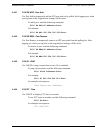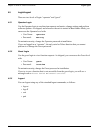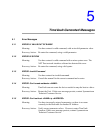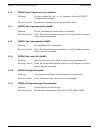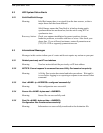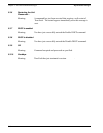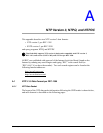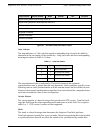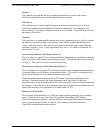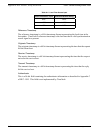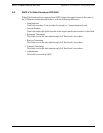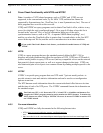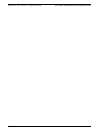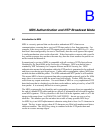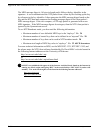
6000-100AppA.fm Rev. C TimeVault™ User’s Manual A-93
NTP V 3.0 Data Format per RFC-1305 Appendix A: NTP Version 3, NTPQ, and NTPDC
Stratum
The stratum is an eight bit integer providing the stratum level of the time source.
TimeVault operates in stratum 1, denoting a primary reference.
Poll Interval
The poll interval is a signed eight bit integer used as the exponent of two to yield in
seconds the minimum interval between consecutive messages. For example, a poll
interval value of six implies a minimum interval of 64 seconds. TimeVault does not alter
the setting of this field.
Precision
The precision is a signed eight bit integer used as the exponent of two to yield in seconds
the precision of the local time source and any other hardware affecting the base level
“jitter” of the time server. This field is set to approximate TimeVault’s time stamping
resolution, which is 10 µs. So the precision byte is set to –16, which is equivalent to a
precision of 15.26 µs.
Synchronizing Distance (Root Delay Version 3)
The root delay is a signed 32 bit fixed point number representing the predicted round-trip
delay in seconds to the primary synchronizing source. The fraction point is between bits
15 and 16. This value is set to 0 seconds in TimeVault.
Synchronizing Dispersion (Root Dispersion Version 3)
The root dispersion is a signed 32 bit fixed point number representing the maximum error
in seconds relative to the primary synchronizing source. This value is a function of the
precision and the quality of the synchronization input option.
When the synchronization input option is GPS, then TimeVault self determines the
accuracy. Once the accuracy has been determined, then TimeVault sets the root
dispersion equal to ten times the square root of the sum of the squares of the precision and
the accuracy, except for the ACTS synchronization option, where the root dispersion is set
equal to the accuracy (see Appendix E for details about ACTS).
Reference Clock Identifier
The reference clock identifier is a 32 bit code identifying the particular type of timing
source. Strata 0 and 1 use a four-octet, left justified, zero-padded ASCII string.
TimeVault operates as Stratum 1 and uses this four-octet string based on the local time
source input as shown in Table A-2 below. This setting is determined based on
TimeVault’s synchronization input option.



